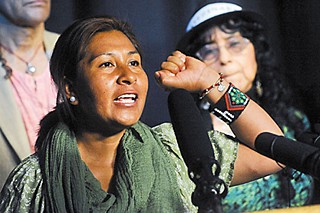Searching for the Disappeared
Families of missing Mexican students bring their story to the U.S.
By Tony Cantú, Fri., March 27, 2015

Members of the Ayotzinapa 43 Caravan – a group representing family members of Mexican students kidnapped in late September – stopped in Austin recently to recount their experiences and raise awareness about historic and ongoing human rights violations in their country.
"I was there," Omar García, a 24-year-old student, said in an interview before his formal talk at the Santa Julia Catholic Church on March 19. He was joined by María de Jesús in addressing the crowd of more than 50 attendees. "I was there when the bullets began to fly and I was able to hide behind a pole," he said in Spanish. "It is difficult, but I'm not experiencing trauma. Maybe after tonight, there might be those consequences."
García was acknowledging the emotional toll it takes to relive the horrific moments of last September, when police and an organized crime cartel are believed to have killed six, wounded 25 more, and kidnapped 43 students from the Raúl Isidro Burgos Rural teachers' college of Ayotzinapa. A clear account of what happened to the students has yet to be given. What is known is that about 100 students traveled to Iguala, Guerrero, to protest education reforms, and 43 were rounded up by the police and have not been seen since. The police have blamed a drug cartel; many believe the police themselves are responsible for the students' disappearance, although there is also notorious overlap between drug gangs and Mexican police. The incident has galvanized family members to shed a broader light on systemic human rights abuses in Mexico, including the indirect complicity of the United States via the Mérida Initiative, in which the U.S. provides funding to Mexico to "fight organized crime and associated violence." Critics claim the funds often go to military equipment that is used by police and military forces against the Mexican citizenry.
Despite the anguish of not having seen her 18-year-old son since the violence nor knowledge of his fate, de Jesús eloquently addressed those gathered. "Para mi, no es felicidad hablar de México," she said in her native Spanish. ("For me, there is no happiness in talking of Mexico.") "But it's because of this cause that we are here, asking for justice. ¡El pueblo unido jamás será vencido!" she concluded, leading the crowd in one of the most internationally recognized rallying cries of the working class: "The people united will never be defeated!"
"We as parents need to continue to pressure the government of [Mexican President] Enrique Peña Nieto in asking for justice," she said after her formal address. It is by summoning an innate ánimo – the human spirit – that she is propelled to speak, she said. The same fortitude keeps alive hope that one day she might be reunited with her son: "It is with that spirit that I hope we will find each other at any moment."
The caravan was in Austin March 18-20 before departing for Dallas, its last Texas stop. From there the group will go on to Kansas City, St. Louis, St. Paul, and other cities to speak to churches and community organizations. While the incident at Ayotzinapa served as a launching pad, the tour seeks to heighten awareness of pervasive human rights abuses in Mexico, where tens of thousands of forced disappearances and more than 100,000 killings have taken place since 2006. The Ayotzinapa disappearances are also eerily reminiscent of the incident known as Tlatelolco, named for the site where up to 300 students and civilians were massacred by police and military forces amidst social unrest prior to the 1968 Olympics scheduled to take place in Mexico City.
The Ayotzinapa 43 have gained solidarity throughout their tour, including from the Austin City Council in the form of a March 12 resolution expressing support, and from the Texas Senate in the form of a resolution authored by all 31 members, adding the Senate's "voice to those in the international community who are deeply concerned about the missing college students from Mexico."
For more information about the caravan, visit www.caravana43.com.
Below is the full text of the speech given by María de Jesús on March 19, along with the English translation.
Mi nombre es María de Jesús y tengo un hijo desaparecido. Ya se han de imaginar lo que se siente. Imagínese que tiene un hijo desaparecido, o un hermano, o un familiar, o ser querido. Para mí, estar aqui en los Estados Unidos se me hizo muy difícil. No fue fácil llegar para acá. Porque, como usted bien sabe, no andamos buscando la fama. Ustedes saben bien a lo que andamos. Y esto, que estamos aquí, ya se han de imaginar lo que no espera el dia de manana. Pero no nos importa. Lo que a nosotros no interesa es que el gobierno esclarezca los hechos. Ellos son hijos de gente campesino, de gente humilde, de gente sencilla que en verdad necesitamos una escuela para nuestros hijos. El joven de quien estoy hablando era del estado de México, Julio César Mondragón. A el le arrancaron el rostro. Fue una masacre de parte de los policías. Para mí, me da mucho dolor y mucha tristeza hablar de todo esto porque en vivo le arrancaron el rostro hasta los ojos. Hay muchos desaparecidos, hay muchos secuestrados, hay muchos asesinados. De la noche a la mañana no sabemos cuántos muertos hay, cuántos desaparecidos, cuántos secuestrados, cuántos jóvenes con la ilusión de seguir estudiando y no tienen un lugar donde estudiar. Para ellos, salir de la preparatoria, o del CONALEP o de una universidad quieren ser alguien en la vida. Tienen esa ilusión de aprender. Ellos entraron en la Escuela Normal de Ayotzinapa con la ilusión de ser maestros. Para estos tres jóvenes, quiero pedirles que guarden un minuto en silencio. Y se quieren hacer una oración la pueden hacer. Que lo hicieramos del Corazón porque son 43 vidas que están desaparecidas. Es por eso que nosotros estamos aquí, para desmentir a nuestro gobierno.
My name is María de Jesús and I have a missing son. You have to imagine what it feels like. Imagine having a missing child or a sibling or a family member or loved one. For me, being here in the United States is very hard. It was not easy to get over here. Because, as you well know, we don’t seek fame. You know well as to our purpose. And in being here, you can only imagine what awaits us tomorrow. But we do not care. What interests us is that the government clarify the facts. These are children of rural people, humble people, simple people and we really need a school for our children. The young man of whom I am speaking was from the state of Mexico, Julio César Mondragón. They tore his face off. It was a slaughter on the part of the police. For me, it gives me great pain and great sadness to talk about all this because, while living, the tore his face off up to the eyes. There are many missing, many abductees, many killed. From the night to the day, we do not know how many dead there are, how many disappeared, how many kidnapped, how many young people with the hope of further study and have no place to study. For them, leaving preparatory school, or CONALEP or the university they want to be someone in life. They have the hope of leaning. They entered the Escuela Normal de Ayotzinapa with the hope of being teachers. For these three young people, I ask you to observe a moment of silence. And if you want to make a prayer, you can. May we do this from the heart, because there are 43 lives that are disappeared. This is why we are here, to deny our government.
Got something to say on the subject? Send a letter to the editor.








